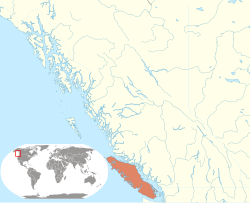Colony of Vancouver Island
| Island of Vancouver and its Dependencies | ||||||||
| British colony | ||||||||
|
||||||||
|
Anthem God Save the Queen |
||||||||
| Capital | Victoria | |||||||
| Languages | English | |||||||
| Religion | Christianity | |||||||
| Government | Constitutional monarchy | |||||||
| Queen regnant | Victoria of the United Kingdom | |||||||
| Historical era | British Era | |||||||
| • | Established | January 13, 1849 | ||||||
| • | Merged with Colony of British Columbia (1858–66) to form Colony of British Columbia (1866–71) | August 2, 1866 | ||||||
|
||||||||

Flag of Vancouver Island (authorized 1865)
The Colony of Vancouver Island (officially known as the Island of Vancouver and its Dependencies), was a Crown colony of British North America from 1849 to 1866, after which it was united with the mainland to form the Colony of British Columbia. The united colony joined the Dominion of Canada through Confederation in 1871. The colony comprised Vancouver Island and the Gulf Islands of the Strait of Georgia.
Captain James Cook was the first European to set foot on the Island at Nootka Sound in 1778, claiming the territory for Great Britain. Fourteen years later, under the provisions of the Nootka Convention, Spain ceded its claims to Vancouver Island and the adjoining islands (including the Gulf Islands). It was not until 1843, however, that Britain — under the auspices of the Hudson's Bay Company (HBC) — established a settlement on Vancouver Island. The settlement was in the form of a fur trading post originally named Fort Albert (afterward Fort Victoria). The fort was located at the Songhees settlement of Camosack (Camosun), 200 metres northwest of the present-day Empress Hotel on Victoria's Inner Harbour.
...
Wikipedia

